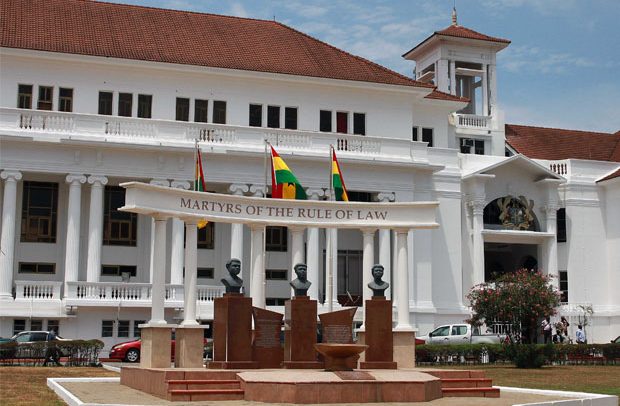The Supreme Court yesterday dismissed an application seeking an interim injunction against the Speaker of Parliament to continue with deliberations on the anti-gay bill in Parliament.
A nine-member panel of the court presided over by Chief Justice Gertrude Torkornoo, said the applicant failed to make a prima facie case to convince the court to injunct the ongoing work of Parliament.
The application flows from a writ filed by researcher, Dr. Amanda Odoi alleging that the Speaker of Parliament breached the 1992 Constitution, particularly Article 108 by allowing the anti-gay bill to proceed to the reading stage without considering the fact that it is a private member’s bill and places fiscal obligations on the Consolidated Fund.
She is asking among others, a declaration that under Article 108, the Speaker of Parliament has a non-discretionary duty to make determination in a non-arbitrary manner as to whether or not a bill, other than a bill introduced by or on behalf of the President offends against Article 108.
She also wants the Supreme Court to declare that the failure of the Speaker of Parliament to perform his non-discretionary duty under Article 108 of the Constitution amounts to a direct violation of the letter and spirit of Article 108 and renders the entire legislative process relating to the bill unconstitutional and void.
Prior to the determination of the case, counsel for the plaintiff filed an application seeking an injunction prohibiting the Speaker from going ahead with any business regarding the bill.
Dr. Ernest Ako, counsel for the plaintiff, moving the motion yesterday contended that the Speaker has failed to comply with Article 108 and has ordered for the bill to proceed in spite of the clear violation of this article of the constitution.
He said Article 108 has been breached and there is a continuing breach of the article, so the applicant has the legal right to come to the court in defence of the constitution.
“This is one of the cases where a bill before it becomes a law can be challenged in court and we are saying that the applicant has that legal right to challenge this bill,” he stated.
Dr. Ako further contended that assuming the bill goes through and becomes law, money would be expended from the Consolidated Fund “meanwhile, Ghanaians would not get back the millions that would have been spent on this law.”
He said if the application is granted and Parliament does not proceed and the substantive matter is determined, Parliament would have just suffered a little by not proceeding with the bill in the interim.
The application was opposed by Thaddeus Sory, counsel for the Speaker who contended that the applicant by their own documents admit that the Speaker had expressed an opinion and from their own admission, Article 108 demands an answer and the Speaker has given an opinion.
He said if the opinion expressed by the Speaker is in error, it does not lie with the applicant to take a contrary view.
He referred to the applicant’s arguments that the Attorney General had expressed a similar view on the bill, but indicated that a Parliamentary Select Committee has already indicated that the Attorney General’s opinions have been taken care of.
Mr. Sory prayed the court to dismiss the application because it did not meet any of the tests set by the apex court in granting injunctions.
Dr. Sylvia Adusu, a Chief State Attorney also opposed the application and argued that the applicant did not prove that the balance of convenience lies with them, and urged the court to dismiss the application.
She contended that the Speaker is doing his duty and cannot be injuncted, adding that Parliament is its own master and the Speaker had taken an opinion which is right and none of the members has challenged that opinion.
The court, presided over by Chief Justice Gertrude Torkornoo and assisted by Justices Paul Baffoe-Bonnie, Gabriel Pwamang, Mariama Owusu, Henrietta Mensa-Bonsu, Yonny Kulendi, Barbara Ackah-Yensu, Samuel Asiedu and George Koomson, in a unanimous decision dismissed the application because the applicant could not convince it to injunct an uncompleted work of Parliament.
The court added that the issues raised by the application for injunction are matters to be determined by the substantive writ.
Meanwhile, the court has also struck out an application seeking to commit the Speaker of Parliament for contempt, for proceeding with the bill in spite of the pendency of the suit, after counsel for the applicant withdrew it.
BY Gibril Abdul Razak


